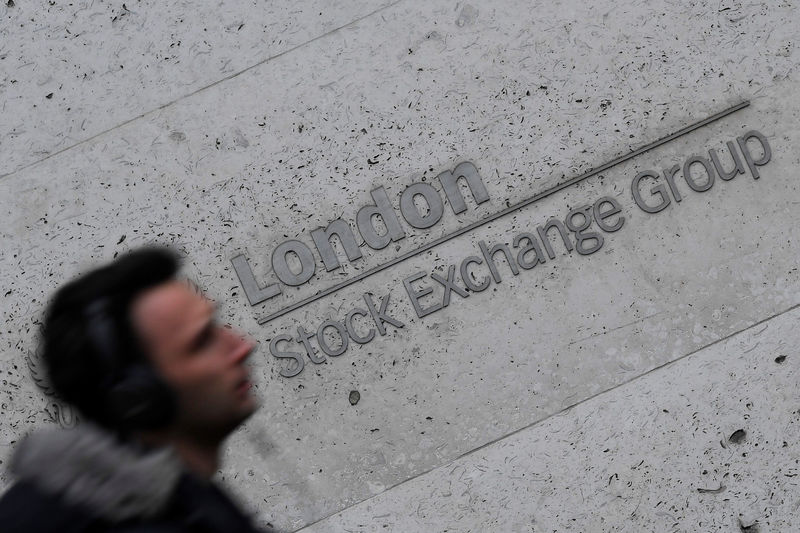By Marc Jones
LONDON (Reuters) - Signs that Italy's latest political drama was over and hopeful noises from Beijing in the trade war pushed Europe's share markets higher on Thursday and paused the relentless steamrollering of global bond yields.
There was still plenty for bearish investors to chew on, however: A sudden rush from Argentina to restructure its debt thrust emerging market risk back into the spotlight, global recession worries simmered, and the pound was groggy after another Brexit-related tumble.
Nevertheless, European shares rose nearly 1% early on led by a 1.7% jump in Italy where the government's bond market borrowing costs also rallied to record lows.
That was after the country's 5-Star Movement and opposition Democratic Party said they would try to form a coalition, setting aside years of hostility to avert a snap election and the economic uncertainty that comes with it.
The two sides still need to agree on a shared policy platform and a team of ministers, but 5-Star chief Luigi Di Maio and his PD counterpart Nicola Zingaretti said they had pledged to find common ground for the good of the country.
"We love Italy and we consider it worthwhile to try this experience," Zingaretti told reporters. Speaking shortly afterwards, Di Maio said: "We made commitments to the Italians...and come what may we want to fulfil them."
There was little reaction from the euro but there was barely any currency market action generally.
The Japanese yen was a touch higher heading for its biggest monthly rise since May, while sterling was flirting with a January 2017 low of $1.2015 against the dollar after Prime Minister Boris Johnson's plan on Wednesday to suspend Britain's parliament increased no-deal Brexit nerves.
China's yuan had dipped for an 11th straight session although a firmer-than-expected central bank fixing helped stem deeper losses and against a basket of currencies the dollar was steady around 98.190.
On the latest trade war development, China said it and the United States were discussing the next round of face-to-face trade talks in September and voiced hopes that U.S. President Donald Trump would cancel plans for additional trade tariffs.
In the latest tit-for-tat escalation of the trade war between the world's two largest economies, Trump last Friday announced additional duties of 5% on targeted Chinese imports worth about $550 billion to be imposed in stages from Sept 1 to mid-December.
The announcement came hours after China had unveiled retaliatory tariffs on $75 billion worth of U.S. goods.
"The most important thing at the moment is to create necessary conditions for both sides to continue negotiations," China's commerce ministry spokesman, Gao Feng, told reporters.
HOW LOW CAN YOU GO
The comments had come after a choppy Asian session. MSCI's broadest index of Asia-Pacific shares outside Japan fell 0.15%, Singapore shares hit eight-month lows and Japan's Nikkei ended fractionally lower.
Bond markets around the world were also still grappling with recession worries. Yields on 30-year U.S. Treasuries and 10-year German bunds had both hit record lows - 1.905 percent and minus 0.716 percent respectively.
Inversion also remains a prominent feature across the U.S. yield curve, where long-dated yields are below short-dated ones - a reliable indicator ahead of U.S. recessions in the past.
The 10-year Japanese government bond yield had dipped 1 basis point to minus 0.285% overnight too, which is just above its record low of minus 0.300% touched in 2016.
"Falls in global bond yields reflect growing concerns that long-term global growth is slowing down on U.S.-China tensions and worries over subsequent global supply chain disruptions," said Tomoo Kinoshita, global market strategist at Invesco Asset Management in Tokyo.
"Stock markets on the other hand are supported in the near-term by hopes of more stimulus, notably from the Federal Reserve and the European Central Bank," he said.
The two major central banks are expected to cut rates next month, while many investors believe the Bank of Japan could join the fray if market sentiment weakens further.
(Graphic: S&P dividend yield vs 30-yr U.S. Treasury link: https://fingfx.thomsonreuters.com/gfx/mkt/12/5337/5289/Pasted%20Image.jpg)
ARGENTINA RESTRUCTURING
Precious metal investors were still on a quest to buy safer assets.
Gold rose as high as $1,543 per ounce, near six-year highs of $1,556.1 set earlier in the week, while silver rose 1.2% to $18.55 per ounce which is just shy of a 2017 peak of $18.65 an ounce.
Also reflecting nervousness, the Merrill Lynch move index, a gauge of investors' expectations on how volatile U.S. bonds will be, has risen back near three-year highs marked earlier this month.
The MSCI emerging market currency index was also at its lowest levels since mid-November, having fallen 0.9% so far this week and set for its biggest monthly fall in more than seven years.
The latest hit came in Argentina as it said it wanted to restructure a large chunk of its bonds by extending their maturities and to "re-profile" the maturities of debt owed to the IMF under a $57 billion standby agreement.
The battered peso took another hammering on Wednesday, even though the central bank intervened heavily in the foreign exchange market for a second consecutive day.
Argentine assets have been slammed since business-friendly President Mauricio Macri was trounced in primary elections by centre-left Peronist challenger Alberto Fernandez.

"President Macri instructed me to solve the short-term problem to guarantee electoral stability, but also in the medium- and long-term so as not to leave a problem for the person who follows, be it he or another candidate," Argentina's Treasury Minister, Hernan Lacunza, said.